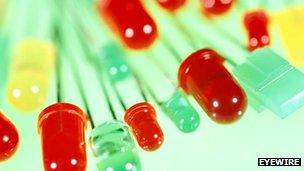University of Dundee to lead project to improve LEDs
- Published

Dundee researcher will lead a project aiming to improve the efficiency of LEDS
The University of Dundee is to lead a European-wide research project aiming to transform the way the world is lit.
Researchers are working on a new generation of white light-emitting diodes (LEDs) that would be much more efficient than existing light bulbs.
Currently, LED lights are only about 25% efficient and the researchers are hoping to improve that to 50-60%.
The project is being funded through a £7.2m grant from the European Union's FP7 programme.
It is estimated that efficient white light LEDs, if successfully developed and widely implemented, could have a massive effect on reducing global energy consumption and C02 emissions.
More efficient
Professor Edik Rafailov, NEWLED project leader based in the School of Engineering, Physics and Mathematics at Dundee, said: "Common lightbulbs have a pretty low efficiency rating and even the best current white LEDs in use only have an overall efficiency of around 25%.
"What we are aiming to develop is a significantly more efficient white LED, which would be around 50-60% efficient. If we can do that and it becomes widely adopted then the effects on energy consumption would be enormous.
"It would also produce lighting over which much more control could be exercised in brightness and tone."
Scientists on the project intend to examine every stage of the current LED fabrication process.
The goal is to develop a range of areas where they can make improvements, such as new levels of control of semiconductor properties on a near-atomic level to light mixing and heat management.
- Published16 January 2013
- Published12 December 2012
- Published16 November 2012
- Published15 October 2012
- Published7 August 2012